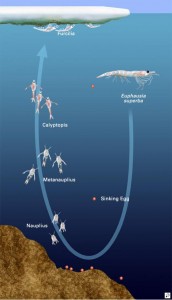Krill – Solution to a Problem or a Problem Without a Solution?
Mar 28th, 2014 by oliviaszostek
 Euphausia superba, otherwise known as Antarctic krill, are a small little crustacean that live in large schools, have thin transparents bodies, and may be associated with the animated hit “Happy Feet 2” which features Will the Krill. This semester, I learned two interesting things about krill. The first, is that krill have been presented as the potential solution to world food hunger, due to its high production rates and high sustainable yield (Nicol & Endo, 1999; Rufus, 2011; Fogleman, 1983). Second, krill are an integral part of their ecological system, and their absence would mean large scale dramatic effects for the Antarctic ecosystem (British Antarctic Survey, 2004; Butterworth & Thomson, 1995). In light of these two new pieces of knowledge, I have found there to be a conflicting argument.
Euphausia superba, otherwise known as Antarctic krill, are a small little crustacean that live in large schools, have thin transparents bodies, and may be associated with the animated hit “Happy Feet 2” which features Will the Krill. This semester, I learned two interesting things about krill. The first, is that krill have been presented as the potential solution to world food hunger, due to its high production rates and high sustainable yield (Nicol & Endo, 1999; Rufus, 2011; Fogleman, 1983). Second, krill are an integral part of their ecological system, and their absence would mean large scale dramatic effects for the Antarctic ecosystem (British Antarctic Survey, 2004; Butterworth & Thomson, 1995). In light of these two new pieces of knowledge, I have found there to be a conflicting argument.
Since the collapse of fisheries and various stocks of fish globally, much research has been poured into exploring how to recover these stocks, and also how to avoid this from happening to other aquatic species (Allison & Horemans, 2006; Berkes & Colding, 2000) . All the while that this is going on, world demand for food has and will continue to increase, and more mouths are needing to be fed. The concept of “feeding down the food web” was presented by academic researcher Daniel Pauly at UBC’s research facility. This concept acknowledged that as we exploit fish stocks of upper trophic levels, we consequently end up fishing lower and lower trophic levels (Pauly et al., 1998). Associated with this is research that has suggested that as you go down a trophic level, sustainable yields increase by a ten fold (Pauly et al., 2002). From this, it seems rational to suggest that we should begin to integrate krill into our diet directly (it is currently mainly used as fish food), and consequently begin solving issues of food shortages around the world.
 However, at the same time that this idea has been brought to light, we have been seeing major impacts in the Antarctic as a result of global warming (Flores et al., 2012). As the ice melts, the krill are increasingly affected due to the fact that ice algae is their primary source of food. Take away ice, you take away krill. Take away krill, and you taken away, or radically transform, an entire ecosystem.
However, at the same time that this idea has been brought to light, we have been seeing major impacts in the Antarctic as a result of global warming (Flores et al., 2012). As the ice melts, the krill are increasingly affected due to the fact that ice algae is their primary source of food. Take away ice, you take away krill. Take away krill, and you taken away, or radically transform, an entire ecosystem.
These two issues converge to make for an interesting conversation. Researchers may use tactics of ecosystem modelling and use of policy instruments such as Total Allowable Catch (TAC) to protect krill, while also increasing its importance in our food system. However, how accurate are we at making these predictions will largely determine the fate of krill and its surrounding ecosystem. Adding to this is the question of how well will we be able to forecast ecosystem impacts on krill , if they become subject to pressures from not only climate change, but intensified fishing practices as well?
References
Allison, E. H., & Horemans, B. (2006). Putting the principles of the sustainable livelihoods approach into fisheriesdevelopment policy and practice. Marine policy, 30(6), 757-766.
Berkes, F., Folke, C., & Colding, J. (Eds.). (2000). Linking social and ecological systems: management practices and social mechanisms for building resilience. Cambridge University Press.
British Antarctic Survey. (2004, November 4). Food Shortages Threaten Antarctic Wildlife. ScienceDaily. Retrieved April 22, 2014 from www.sciencedaily.com/releases/2004/11/041104001422.htm
Butterworth, D. S., & Thomson, R. B. (1995). Possible effects of different levels of krill fishing on predators–some initial modelling attempts. CCAMLR science,2, 79-97.
Flores, H., Atkinson, A., Kawaguchi, S., Krafft, B. A., Milinevsky, G., Nicol, S., … & Werner, T. (2012). Impact of climate change on Antarctic krill.
Fogleman, V. M. (1983). Antarctic krill: problems and potential.
Nicol, S., & Endo, Y. (1999). Krill fisheries: development, management and ecosystem implications. Aquatic Living Resources, 12(02), 105-120.
Pauly, D., Christensen, V., Dalsgaard, J., Froese, R., & Torres, F. (1998). Fishing down marine food webs. Science, 279(5352), 860-863.
Pauly, D., Christensen, V., Guénette, S., Pitcher, T. J., Sumaila, U. R., Walters, C. J., … & Zeller, D. (2002). Towards sustainability in world fisheries. Nature,418(6898), 689-695.
Rufus, A. (2011, December 16). Can Krill End World Hunger?. The Daily Beast. Retrieved April 22, 2014, from http://www.thedailybeast.com/articles/2011/12/16/can-krill-end-world-hunger.html